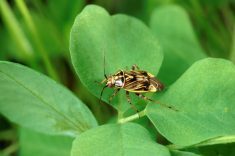Bayer is committing more than US $10 billion to resolve U.S. lawsuits connected to Roundup, the company announced today.
But the agreements, between Bayer and numerous law firms in America, don’t apply to potential class action lawsuits in Canada, said Tony Merchant, founder of Merchant Law Group.
“We don’t really know, right now, where this will lead,” Merchant said Wednesday afternoon, from his office in Regina. “We have to go forward with the certification actions that we have underway. And try to press Bayer to deal fairly with (claims) in Canada.”
Read Also

Farming Smarter receives financial boost from Alberta government for potato research
Farming Smarter near Lethbridge got a boost to its research equipment, thanks to the Alberta government’s increase in funding for research associations.
Bayer has been facing thousands of legal cases in the United States, and elsewhere, where claimants said exposure to glyphosate (the active ingredient in Roundup) contributed to their development of cancer.
Bayer’s legal troubles began after the company acquired Monsanto, the maker of Roundup herbicide, in 2016. The takeover was finalized in 2018.
Payments of $10.1 – $10.9 billion should resolve the majority of the lawsuits in America, Bayer said in a statement.
“(It) will bring closure to approximately 75 percent of the current Roundup litigation involving approximately 125,000 filed and unfiled claims overall,” Bayer said. “The resolved claims include all plaintiff law firms leading the Roundup federal multi district litigation or the California bellwether cases and those representing 95 percent of the cases current set for trial.”
The majority of glyphosate lawsuits are in the U.S., but Canadians are also pursuing legal action regarding the safety of glyphosate.
In May of 2019, Merchant said his firm was trying to certify a class action suit against Bayer. The lead plaintiff in the case is Garry Gadd, a farmer from Moose Jaw, Sask. Gadd claims that exposure to glyphosate contributed to his cancer. He was diagnosed with non-Hodgkin’s Lymphoma in 2014.
In Canada, a judge must certify a case before it can proceed as a class action.
Initially, less than 12 Canadians had joined the Merchant Law Group case.
As of late June, the number was much higher.
“Slightly over 500,” Merchant said.
In the U.S., Bayer will make a payment of $8.8 billion to $9.6 billion to resolve the current Roundup litigation and $1.25 billion to address potential future litigation.
Bayer did not admit liability or wrongdoing.
Bayer has reached a series of agreements that will substantially resolve major legacy Monsanto litigation.
Find more on our website:https://t.co/6IyqRw3rcT— Bayer AG (@Bayer) June 24, 2020
Merchant, who is also a member of the bar in Arizona, said the agreements between Bayer and U.S. law firms was likely in the works for a while.
“My view is… they’ve gone to the major firms that have a lot of cases ongoing and they have agreement, otherwise they wouldn’t have made this announcement,” he said “But they can’t announce it’s a settlement because there are still other (firms) who they may not have even contacted…. Their expectation is the firms with few claims, will go along with the firms that are leading the battle.”
In Canada, Merchant Law Group isn’t the only law firm pursuing a class action against Bayer. Last summer Diamond & Diamond Lawyers, which has offices in Ontario, Alberta and British Columbia, filed statement of claims against Bayer and Monsanto in those three provinces.
It claimed that glyphosate was a factor in its clients getting cancer and said it is suing Bayer for $500 million in damages.
It’s difficult to know if and how the U.S. agreements will affect potential Bayer payments in Canada. However, Canadians may not receive the same compensation as Americans.
“They (chemical companies) always want to try and pay less to people who have suffered in Canada, than they are prepared to pay in the United States,” Merchant said.
The lawsuits stem from a 2015 decision by the International Agency for Research on Cancer – a division of the World Health Organization.
IARC scientists classified glyphosate as probably carcinogenic to humans.
Since then, numerous regulatory bodies, including Health Canada and the U.S. Environmental Protection Agency, reviewed the scientific evidence and concluded the herbicide is safe.
“No pesticide regulatory authority in the world currently considers glyphosate to be a cancer risk to humans at the levels at which humans are currently exposed,” Health Canada said in January 2019.
Such clear and crisp decisions, by national regulators, don’t seem to matter in the legal world. The number of glyphosate lawsuits have expanded, nearly every day.
As of April, Bayer had been sued by 52,500 U.S. plaintiffs who blame glyphosate-based herbicides for their cancer, up from 48,600 in February, Reuters reported.
And legal firms had lined up tens of thousands of additional claimants.
The numbers are much, much smaller in Canada. But people continue to call Merchant Law Group, looking to join its class action case.
The majority of people have non-Hodgkin’s lymphoma. It’s a cancer of the body’s lymphatic system, which fights off disease.
“I’d say it’s 90 percent non-Hodgkin’s lymphoma,” Merchant said last year. “A … disproportionate large percentage are in the three prairie provinces and a lot in the Peace River area. It’s clear they’re from farming communities.”
Contact robert.arnason@producer.com


















